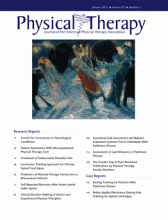We thank Basso for her thoughtful commentary1 on our article.2 Her perspective is particularly valuable, given her experience with studies of spinal cord injury in both humans and in animal models. As Basso notes, identifying the critical training features that best promote locomotor recovery is essential for optimal outcomes. We are pleased that the commentary focuses on what we feel is the primary message of our study: task-specific training that capitalizes on the principles of motor learning appears to be beneficial for improving walking function in individuals with spinal cord injury, even many years after injury. Studies of neuroplasticity in animal models have demonstrated that simply repeating a movement is not sufficient for motor learning.3 As we note in our article, allowing variability in the task being practiced provides opportunities to make and correct movement errors. The opportunity to correct errors seems to be associated with greater improvements in control of movement, not only as related to improving gait4 but also as related to other motor behaviors such as reaching to a target5 (for a review, see Bastian6).
In our study, although the overground …












